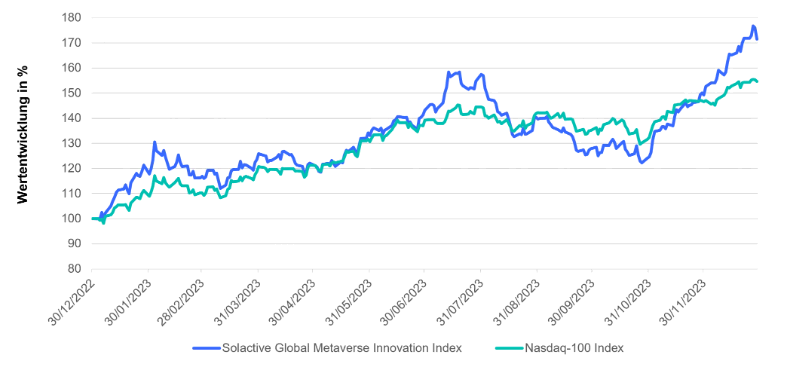The interplay between the metaverse and another revolutionary technology – artificial intelligence (AI) – has boosted the performance of technology stocks in 2023.
Marcus Weyerer, Senior ETF Investment Strategist, EMEA, at Franklin Templeton ETFs, looks at the industrial and consumer-facing applications of the metaverse, the role of AI in optimizing these areas, and the significant growth potential and investment opportunities this virtual world opens up.
The metaverse creates a decentralized, blockchain-based virtual realm that opens up an exciting world for users in the areas of society, work, business and leisure. In recent years, well-known companies have already used the metaverse to increase the efficiency of their planning and production processes. For example, leading German car manufacturer BMW uses NVIDIA’s Omniverse to simulate factory settings long before actual production begins. This proactive approach enables the company to identify and fix problems, streamline processes and minimize inefficiencies – and ultimately save a lot of money. Of course, the industrial metaverse often lacks the glamor and atmosphere of the home metaverse, which can offer leisure activities such as a virtual meeting at a café on the beach. However, industrial use is expected to contribute significantly to the overall growth of the metaverse market, which could reach USD 500 billion by the end of the decade.
Both sectors of the virtual world are increasingly relying on an equally powerful technology – AI. AI not only provides a higher quality of experience for the user, but also changes it. Imagine a virtual café for a moment: The more accurate your friends’ facial expressions and body language are, the more authentic the interaction becomes. But perhaps you also want a lively atmosphere with other “people” visiting the café. Again, AI can help create a more realistic environment where you can interact with digital humans rather than bland, more traditional characters that are not controlled by players (non-player characters, or “NPCs” for short). If there are actual humans virtually present, you can even converse with them in your preferred language thanks to AI advancements.
In South Korea, a pioneer in AI, AI-generated K-pop bands are storming the charts and winning the hearts of audiences. Apart from the entertainment industry, Seoul has initially earmarked USD 180 million to build its metaverse infrastructure. Technology research firm ABI Research predicts that by 2030, around 700 cities worldwide will be using the metaverse for e-government, virtual tourism and remote work provision.
In the industrial metaverse, AI applications are probably even more important, not least in financial terms. A good example is Surgical Science, a provider of devices and software for simulating medical procedures. The company’s simulations have shown that the error rate has dropped significantly after training. It’s not just in medicine that AI-driven environments can accurately recreate real-life scenarios, making training more efficient, effective and virtually risk-free. Last year, for example, the British Royal Air Force teamed up with an augmented reality (AR) technology company to improve its air combat training. The simulations not only reduce costs and environmental impact, but also significantly improve safety. With the help of AI, pilots wearing AR headsets can even train close combat with color and high-resolution images, simulating scenarios that are virtually impossible to recreate in conventional training situations.
Solactive Global Metaverse Innovation Index vs. Nasdaq-100 Index
December 2022 to December 2023

Source: Bloomberg, as of December 31, 2023. The Solactive Global Metaverse Innovation Index comprises companies that either provide or use innovative technologies for products and services related to the metaverse and supporting blockchain technologies.
The metaverse could also be of interest to investors chasing high yields. The past year has been a real comeback for the technology sector, and metaverse and AI stocks have performed particularly well. With a price increase of 71% in 2023, the Solactive Global Metaverse Innovation Index outperformed the Nasdaq-100 Index by around 17 percentage points. Overweights in the application software and interactive media sub-sectors as well as a significant exposure to AI-related stocks of almost 40% helped the Solactive Index to achieve a strong performance. Despite the distinctive index composition, the Metaverse Index is only slightly more expensive than the Nasdaq-100 on a cash flow basis (with a price-to-cash flow ratio of 24.1 versus 22.3), but a whopping 50% cheaper on a price-to-book basis.
We are convinced that the metaverse’s position at the intersection of blockchain technology and AI will continue to offer promising investment opportunities in the future. As recent developments have shown, these sectors have considerable growth potential. With its diverse applications across all industries, an AI-powered metaverse is likely to fundamentally change the way we interact, work and do business in the future. These structural trends therefore open up numerous opportunities for investors, but those who want to participate in the development must be able to cope with the volatility that comes with investing in new technologies.

















